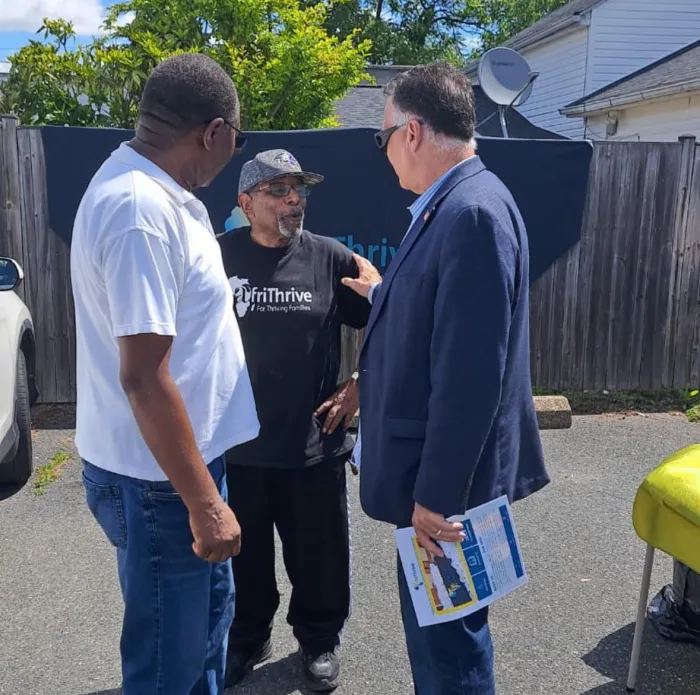
Storytelling and elevating community voices to shift narratives
Powerbuilding begins with voice. Across communities, partners use storytelling to reclaim narratives, illuminate lived experiences, and influence systems that have long overlooked them. Whether through personal testimony, film, public events, or civic engagement, these efforts shift dominant narratives and center the wisdom of people closest to the challenges. In doing so, they affirm that telling one’s story is not just an act of reflection—but of transformation and power.
Powerbuilding partners find different reasons and ways to incorporate storytelling into their respective projects. At Rock Steady Farm, storytelling is used as a tool to increase representation and visibility of queer and trans farmers. When they first started, Rock Steady Farm found that the lack of representation in farming also limited their opportunities to gain experience and access to land and funding. Maggie Cheney, co-owner and director of Rock Steady Farm, emphasizes that:
Our storytelling work includes short films, skills-based video tutorials, and leadership development opportunities for farmers often erased from mainstream agricultural narratives... When you look online for farming skill shares—like tractor training videos—they’re almost always led by white men. So, we were intentional about creating our own short videos, showing things like how to safely turn on a tractor. It matters that people see a non-binary, mixed-race person teaching those skills with confidence. Folks are more likely to enter agriculture if they see someone who looks like them doing the work.
Media Highlight
Storytelling, used in this way, can connect individual stories to collective action and societal changes. Cheney adds: “We felt a responsibility to use our platform to lift up our community and to show what’s possible—not just here, but around the world.” Their work began on an individual level with the efforts to train and support farmers to thrive, and is making waves in the dominant narrative of who is a farmer.
Another powerbuilding partner, AfriThrive takes a similar approach to storytelling through the Balozi advocacy program which provides the space and tools for immigrant communities to share experiences with local leaders and politicians. Balozi is a Swahili term that means ‘ambassador’, signifying that the program was created to train community members to be ambassadors of their own stories. Dr. Truphena Choti, Founder and CEO of AfriThrive, adds that:
We are training community members to be ambassadors of their own stories, their needs, and solutions... These are very personal, compelling experiences that connect deeply with others and make our agenda more humane, more understandable. Many had never shared their stories, even with loved ones. Creating space for that vulnerability was powerful. It became a space for healing, a place where people felt accepted and unjudged—where they understood their voice could lead to change.

The mission of both Rock Steady Farm and AfriThrive in increasing access to land stewardship and culturally meaningful food for Queer, Trans, Black, Indigenous, and People of Color (QTBIPOC) farmers and African immigrant and minority families, respectively, is catalyzed by storytelling and narrative shifting.
Co-op Dayton utilizes storytelling at events as an avenue to bring people together. Morgan Muhammad of Co-op Dayton describes an event held at Gem City Market, their member-owned supermarket, and how storytelling was interwoven into this event:
We gathered to talk and take action in community after this year’s Martin Luther King Day March. There was a lot of cooperation and collaboration on display from a storytelling standpoint. It was really encouraging for us to be able to show an example of what cooperation looks like in real time in a very intentional space. We had a group discussion around the concept of We Shall Overcome and how to actualize that. We had a lot of leaders from the different community movements be part of that dialogue and a music collective called Village Music bring some creativity and some music into the conversation. It really brought a lot of people into the space and a lot of good dialogue.
Media Highlight
Co-op Dayton celebrates MLK day at Gem City Market, where they invited community members to engage in dialogue, featuring radio shows and DJs to bring good music and vibes.
Facilitating a space for dialogue allowed Co-Op Dayton to foster connections within their community, and develop ideas and actions for change. By and large, powerbuilding partners have experienced firsthand how storytelling at an individual level can lead to positive changes in structures and systemic beliefs. Changes in practices and policies begin with changes in perceptions.
Narrative is how we communicate our values through stories, bringing alive the motivation we need for changing the world. Because it engages the head and the heart, narrative can instruct and inspire, not only teaching us about why we should act but also moving us to take action.
- re:power

